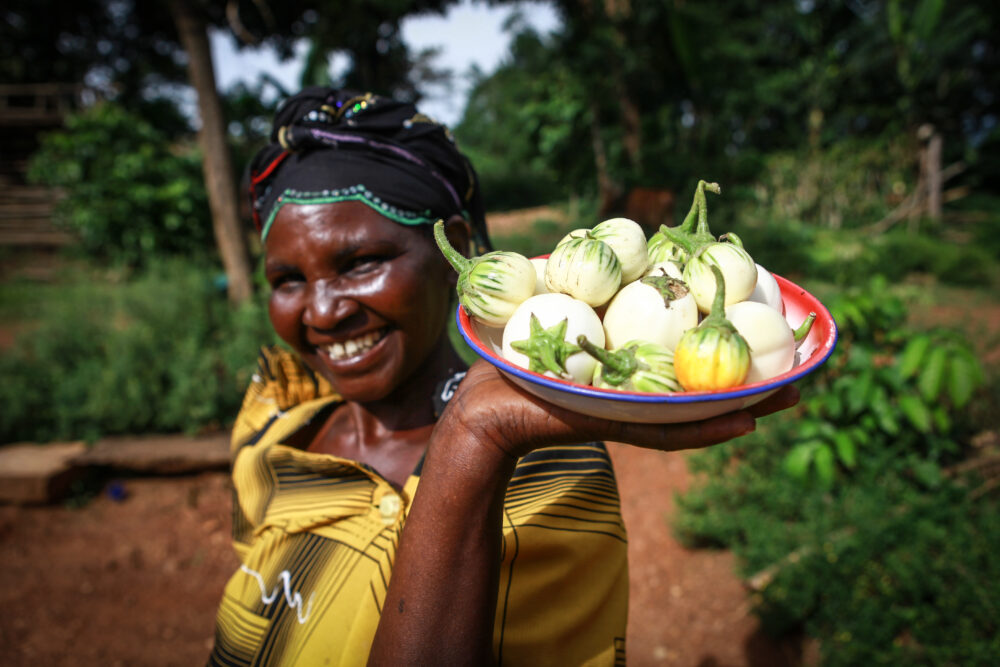We need to talk about gender based violence as a barrier to the right to food
Date
October 17, 2020
It is time to reflect on the global food system. According to the UN Report on the State of Food Security and Nutrition in the world, 60 million more people are hungry today then there were five years ago. Three billion men, women and children cannot afford enough healthy food to eat.
The global food system is broken…..and we need to acknowledge it and we need to commit to fixing it.
As World Food Programme receives the Nobel Peace Prize we are reminded of the interconnectedness of conflict, climate change and now the global pandemic that has threatened the right to food for so many people.
But we must not forget gender inequality as a root cause of the denial of the right to food for so many women and girls. Harmful gendered social norms and inequalities means women are more likely to be denied the right to food.
Gender based violence remains a significant barrier to affirming the right to food for women and girls. If we do not address gender-based violence, then we cannot achieve the right to food. When women are hurt, food insecurity and poverty will prevail. Eliminating gender-based violence (GBV) is not a luxury but crucial, not only because it violates human rights but also because it reinforces many contributing factors to more violence against women
Globally, but in particular, in the agriculture sector and in rural areas, gender-based violence (GBV) is pervasive. Statistics show that on average one in three women experience physical or sexual abuse in her lifetime.
The organizational position paper on gender-based violence for We Effect and Vi Agroforestry define it as:
Any act that is perpetrated against a person’s will and is based on gender norms and unequal power relationships. It includes physical, emotional / psychological, and sexual violence, violence based on Sexual Orientation, Gender Identity or Expression (SOGIE), as well as denial of resources or access to services. Violence includes threats of violence and coercion. GBV includes structural and institutional violence. GBV inflicts harm on women, girls, men, boys, transgender, intersex and non-binary individuals and is a severe violation of several human rights.
This definition highlights how extensive and pervasive the problem of gender-based violence is at a global level. The denial of the right to food is, in itself, a form of GBV. Harmful social gendered norms at household level means that women often eat least, eat last and eat least nutrious food. Gendered norms about ownership of land, assets and resources mean that women are denied socio-economic and civil and political rights, which is a form of structural violence
Food insecurity can exacerbate the severity or impact of GBV.
The experience of GBV can also heighten food insecurity by undermining the physical and psychosocial well-being of survivors. Injuries or illness can affect a survivor’s capacity to work, limiting their ability to produce or secure food for themselves and their families. Stigma and exclusion may further reduce survivors’ access to food distributions, food- and agriculture related technical trainings, and other forms of support.
As the COVID-19 pandemic unfolds its posing new challenges to rural women with regards to their roles in household food security, as agricultural producers, women farmers, informal sector workers and entrepreneurs. Global studies show that rural women are disproportionally affected by health and economic crises including, but not limited to food security and nutrition, time poverty, access to health facilities, services and economic opportunities, and gender-based violence (GBV). Additionally, COVID-19 is increasing women’s work burden due to school closures and the additional care needs of the household members.
FAO projects that another 130 million people can be undernourished due to the corona pandemic. This will of course also particularly impact on women and likely increase violence against women and girls.
The politicisation of food often means the women and marginalised communities (based on multiple identities including political affiliation, SOGIE etc.) are excluded from accessing food aid or humanitarian aid.
In order to maximize the synergies between gender equality and food security strategies, a combination should be found between the recognition of the constraints that women face, and adopting measures that help relieve women of their burdens, and the redistribution of gender roles in the family responsibilities
Women are agents of change and key players in global food system. We need to transform harmful gender norms that perpetuate gender-based violence to ensure that women can fully affirm their right to food and ensure recognition for their significant contribution to the agriculture sector and the production of food.
Gender Global Thematic Expert Group for We Effect and Vi Agroforestry
WRITTEN BY